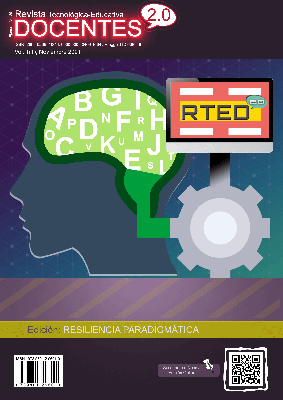Aidan Chambers Theory of Literary Conversation as a Strategy for Strengthening Reading Comprehension
 DOI:
https://doi.org/10.37843/rted.v1i1.273
DOI:
https://doi.org/10.37843/rted.v1i1.273
Main Article Content
Abstract
Poor reading comprehension is one of the main problems faced by primary school teachers. In addition, it is one of the limiting factors in the academic performance of children in Colombia. This research analyzed the incidence of Aidan Chambers' theory of literary conversation in strengthening reading comprehension in the third grade, Sede R Jagüi of Colegio Juan XXIII. The implemented methodology was based on the qualitative methodological paradigm, Action Research (IA), supported by a critical analysis with the active participation of the agents involved. The research was carried out with a group of two students. It was executed through the virtual teaching modality using the Zoom, WhatsApp, and Educaplay platform, through videos, album books, compositions, games, creations. The study was carried out with a sample of 2 third-grade students; their ages range between 8 and 9 years. It was proposed in the didactic unit of five work sessions to improve reading comprehension and address a series of themes about the territory. They made their productions to feed the final product (a web page) on the page. The proposal was effective, as can be seen from the results of the applied test in which it is possible to show the innovative strategies that allowed to improve the understanding of reading habits.
Downloads
Metrics
Article Details

This work is licensed under a Creative Commons Attribution-NonCommercial-NoDerivatives 4.0 International License.
Those authors who have publications in our journal accept the following terms:
- When a work is accepted for publication, the author retains rights of reproduction, distribution of his/her article for exploitation in all countries of the world in the format provided by our magazine and any other magnetic medium, optical, and digital.
- Authors will retain their copyright and guarantee the journal the right first to publish their work, which will be simultaneously subject to the Creative Commons Acknowledgment License (Attribution-NonCommercial-NoDerivatives 4.0 International (CC BY-NC-ND 4.0)). That allows third parties to copy and redistribute the material in any medium or format, under the following conditions: Acknowledgment - You must properly acknowledge authorship, provide a link to the license, and indicate if any changes have been made. You may do so in any reasonable way, but not in a way that suggests you have the licensor's endorsement or receive it for your use. NonCommercial - You may not use the material for a commercial purpose. NoDerivatives - If you remix, transform, or build from the material, you cannot broadcast the modified material. There are no additional restrictions - You cannot apply legal terms or technological measures that legally restrict you from doing what the license allows.
- Authors may adopt other non-exclusive license agreements to distribute the published version of the work (e.g., deposit it in an institutional archive or publish it in a monographic volume) provided that the initial publication in this journal is indicated.
- Authors are allowed and recommended to disseminate their work through the Internet (e.g., in institutional telematic archives, repositories, libraries, or their website), producing exciting exchanges and increasing the published work's citations.
- Request of withdrawal an article has to be done in writing by the author to the Editor, becoming effective after a written response from the Editor. For this purpose, the author or authors will send correspondence via e-mail: [email protected].
- The author will not receive financial compensation for the publication of his work.
- All Docentes 2.0 Journal publications are under the Open Journal System (OJS) platform at: https://ojs.docentes20.com/.
References
Arias, J. (2021). El campesinado en la educación rural: un debate emergente. Pedagogía y Saberes, (54). https://doi.org/10.17227/pys.num54-10555 DOI: https://doi.org/10.17227/pys.num54-10555
Chambers, A. (2007). Dime: los niños, la lectura y la conversación. Fondo de Cultura económica.
Durango-Herazo, Z. (2015). ¿Por qué es importante la investigación cualitativa en la educación? Portal De Las Palabras, 1, 43-46. http://revistas.curnvirtual.edu.co/index.php/portaldelaspalabras/article/view/595
Escudero, C. & Cortez, L. (2018). Técnicas y métodos cualitativos para la investigación científica. Utmach. http://repositorio.utmachala.edu.ec/bitstream/48000/14208/1/Cap.2-
Evoluci%C3%B3n%20de%20la%20investigaci%C3%B3n%20cient%C3%ADfica.pdf
Herrera, J. (2010). La investigación cualitativa. Universidad de Guadalajara. http://biblioteca.udgvirtual.udg.mx/jspui/handle/123456789/1167
Icfes. (2018). Publicación de resultados Saber 3°, 5° y 9°. Ministerio de Educación de Colombia. http://www2.icfesinteractivo.gov.co/ReportesSaber359/consultaReporteEstablecimiento.jspx
Montero, I y León, O. (2002). Clasificación y descripción de las metodologías de la investigación en psicología. Internacional Journal of Clinical and Health Psychology. https://www.researchgate.net/publication/26420207_Clasificacion_y_descripcion_de_las_metodologias_de_investigacion_en_Psicologia
Moreno-Muños, C. & Valverde-Caravaca, R. (2004). Glosas didácticas. Revista Electrónica Internacional, 11(11), 170. https://www.um.es/glosasdidacticas/doc-es/14Carmelo.pdf
Pimienta-Lastra, R. (2000). Encuestas probabilísticas vs. no probabilísticas. Política y Cultura, 13, 263-276. https://www.redalyc.org/pdf/267/26701313.pdf
Puerto, M. L. (2015). El libro álbum. Magisterio, 1(1). https://www.magisterio.com.co/articulo/el-libro-album-como-estrategia-para-la-comprension-lectora
Reyes, Y. (2017). Una vida dedicada a la pedagogía de la lectura desde la primera infancia. Cultura y primera infancia, 1(1). https://maguared.gov.co/yolanda-reyes/
Salazar, M. C. (1992). La investigación Acción Participativa, inicio y desarrollo. Popular. https://nanopdf.com/download/investigacion-accion-participativa_pdf
Salazar, S & Ponce, D. (1999). Hábitos de lectura. 1a. ed. Instituto del Libro y la lectura.
Sandín, M.P. (2010). Investigación Acción. S, Nieto. Principios, técnicas y métodos esenciales para la investigación cualitativa. Pp. 525 -556. http://media.picalab.cl/repo/descargas/bibliografia/Metodolog%C3%ADa%20de%20Investigaci%C3%B3n/Sand%C3%ADn.Investigaci%C3%B3n-Acci%C3%B3n.pdf
Silva de Marco, J. (2004). El texto conversacional. http://www.a43d.com.uy/jenny/el-texto-
Strauss, A., & Corbin, J. (2002). Bases de la investigación cualitativa (Vol. 2). Universidad de Antioquia.






